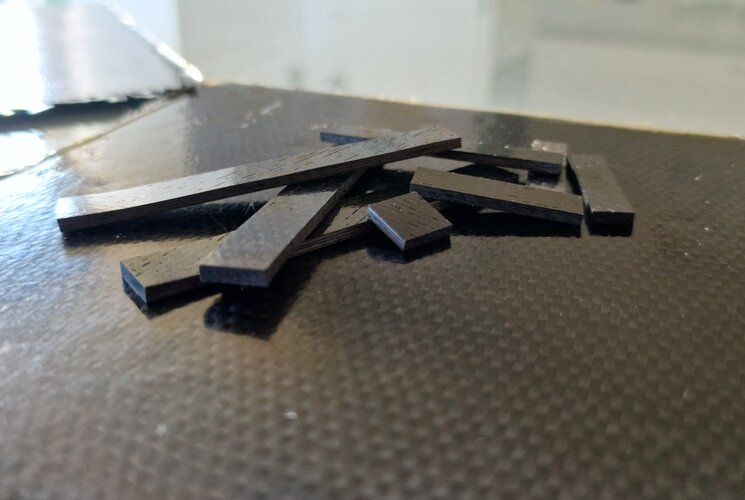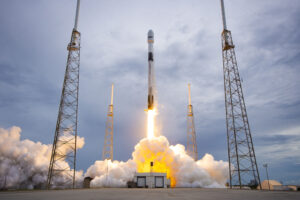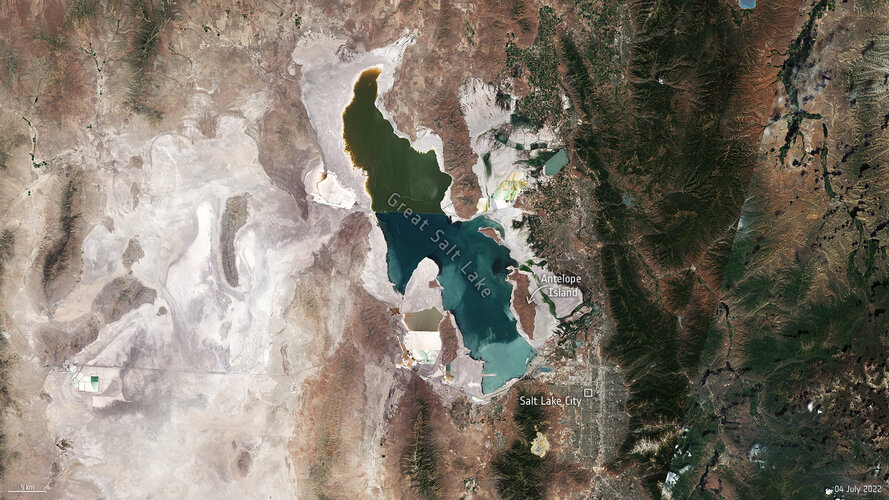100% bio-sourced thermoset composites tested for space
Tuesday, 02 August 2022 04:19
Combining high strength with low weight, corrosion-resistant and shapeable into almost any form, composite materials are a key ingredient of modern life: employed everywhere from aviation to civil engineering, sports equipment to dentistry – and also a vital element of space missions. But they have some less desirable aspects: produced from petroleum products, they are non-renewable in nature and also non-recyclable. So ESA is working with Côte D’Azur University on a new breed of space-quality composites made from wholly sustainable sources.
December launch planned for Polaris Dawn
Monday, 01 August 2022 16:30
The privately funded Polaris Program is planning its first crewed launch on a SpaceX Crew Dragon spacecraft in December, a mission that will include the first spacewalk on a private mission.
SES closes $450 million acquisition of DRS’ satellite communications business
Monday, 01 August 2022 15:53
SES announced Aug. 1 it completed the acquisition of DRS Global Enterprise Solutions, a business acquired from Leonardo DRS for $450 million.
The post SES closes $450 million acquisition of DRS’ satellite communications business appeared first on SpaceNews.
Utah’s Great Salt Lake is disappearing
Monday, 01 August 2022 14:20
Utah’s Great Salt Lake dropped to its lowest recorded water level last month as a megadrought persists across the US southwest, forcing the fast-growing city to curb its water use. From space, satellite images show how water levels have fallen from 1985 to 2022 – exposing large expanses of lakebed.
Proposal by research team could revolutionize space medicine, improve astronaut health
Monday, 01 August 2022 14:10
Often when researching the molecular and biological changes that happen in space, models such as rodents, worms, and yeast are used to study the effects and consequences of long-duration space flight as a way to understand how microgravity impacts humans in space. However, OHIO's Nate Szewczyk, Ph.D., and several other researchers from around the world have published a paper that proposes a program for the European Space Agency that could potentially revolutionize space medicine by routinely collecting biological samples from astronauts for use with cutting-edge technologies to understand the effects on their genes, mRNA, proteins, and metabolites (commonly referred to as "omics" technologies).
The paper, titled "Routine omics collection is a golden opportunity for European human research in space and analog environments," published in the journal Patterns, details how omics profiling is primed to transform space medicine and improve occupational healthcare for astronauts. The paper's authors anticipate that omics profiling will improve astronauts' health and mitigate spaceflight risks, which could increase mission success on more ambitious endeavors such as voyages to Mars. The group of researchers go on to highlight in the paper the collaborative steps that should be taken to design a standardized data resource that can be used for years to come as data and science evolves.
NewSpace may eliminate sun-synchronous orbits
Monday, 01 August 2022 13:25 NewSpace is a recently formed movement and philosophy that encompasses a globally emerging private spaceflight industry. This term is generally used in connection with a global private sector of new aerospace companies and ventures.
One primary objective is to develop faster, better and cheaper access to space and spaceflight technologies. This movement is thought to be a major driving for
NewSpace is a recently formed movement and philosophy that encompasses a globally emerging private spaceflight industry. This term is generally used in connection with a global private sector of new aerospace companies and ventures.
One primary objective is to develop faster, better and cheaper access to space and spaceflight technologies. This movement is thought to be a major driving for China's new quantum satellite now operational
Monday, 01 August 2022 13:25 A Chinese micro-nano quantum satellite has entered its planned orbit and is now operational, the University of Science and Technology of China (USTC), one of its developers, said on Thursday.
The low-orbit satellite was designed to conduct real-time quantum key distribution experiments between the satellite and ground station, and to carry out technical verification. It was launched atop a
A Chinese micro-nano quantum satellite has entered its planned orbit and is now operational, the University of Science and Technology of China (USTC), one of its developers, said on Thursday.
The low-orbit satellite was designed to conduct real-time quantum key distribution experiments between the satellite and ground station, and to carry out technical verification. It was launched atop a JWST reveals highly distant galaxies behind a known gravitational magnifier
Monday, 01 August 2022 13:25 Using the first science image released by the James Webb Space Telescope (JWST) this month, an international team of scientists led by the Max Planck Institute for Astrophysics has built an improved model for the mass distribution of the galaxy cluster SMACS J0723.3-7327. They used dozens of multiple images of far-away background galaxies revealed in the JWST image, some of which were too faint
Using the first science image released by the James Webb Space Telescope (JWST) this month, an international team of scientists led by the Max Planck Institute for Astrophysics has built an improved model for the mass distribution of the galaxy cluster SMACS J0723.3-7327. They used dozens of multiple images of far-away background galaxies revealed in the JWST image, some of which were too faint No room for nationalism in space says China
Monday, 01 August 2022 13:25 Unreasonable queries are being raised online ever since Wentian, the first lab module of China's space station, successfully docked with the core module, Tianhe, on Sunday.
On Quora, someone said that only the Chinese language is used on the spaceship and asked if the country is "super-sealed", and if they are getting rid of scientists from other countries by using a non-international lang
Unreasonable queries are being raised online ever since Wentian, the first lab module of China's space station, successfully docked with the core module, Tianhe, on Sunday.
On Quora, someone said that only the Chinese language is used on the spaceship and asked if the country is "super-sealed", and if they are getting rid of scientists from other countries by using a non-international lang Blue Origin to launch space tourist flight next week
Monday, 01 August 2022 13:25 Jeff Bezos' Blue Origin plans to launch its sixth space tourism flight next week with six people, including the first Egyptian and Portuguese crew members to reach suborbital space.
Blue Origin said in a news release that NS-22 will lift off at 8:30 a.m. from Launch Site One at the company's site in West Texas on Thursday.
The flight will make Sara Sabry, an Egyptian mechanical a
Jeff Bezos' Blue Origin plans to launch its sixth space tourism flight next week with six people, including the first Egyptian and Portuguese crew members to reach suborbital space.
Blue Origin said in a news release that NS-22 will lift off at 8:30 a.m. from Launch Site One at the company's site in West Texas on Thursday.
The flight will make Sara Sabry, an Egyptian mechanical a Space Perspective unveils patented capsule design
Monday, 01 August 2022 13:25 Space travel is about to get safer, more comfortable, and even more thrilling. Space Perspective, Planet Earth's leading luxury space travel company, unveils the patent-pending Spaceship Neptune capsule design now in production at the company's state-of-the-art campus, near its Operations Center at NASA's Kennedy Space Center, Florida.
As the only carbon neutral way to space, Space Perspec
Space travel is about to get safer, more comfortable, and even more thrilling. Space Perspective, Planet Earth's leading luxury space travel company, unveils the patent-pending Spaceship Neptune capsule design now in production at the company's state-of-the-art campus, near its Operations Center at NASA's Kennedy Space Center, Florida.
As the only carbon neutral way to space, Space Perspec Staring at the Ground: Sols 3546-3547
Monday, 01 August 2022 13:25 Today's plan is chock full of goodies! We start out sol 3546 with a ChemCam observation of a sand ripple "Deposito" and an RMI observation of the Bolivar outcrop in the distance. Then we'll do some Mastcam observations of Deposito, "Lilas" which is one of our robotic arm targets later in the sol, Bolivar, and "Deepdale." Once all that wraps up, we'll get into our robotic arm activities for the s
Today's plan is chock full of goodies! We start out sol 3546 with a ChemCam observation of a sand ripple "Deposito" and an RMI observation of the Bolivar outcrop in the distance. Then we'll do some Mastcam observations of Deposito, "Lilas" which is one of our robotic arm targets later in the sol, Bolivar, and "Deepdale." Once all that wraps up, we'll get into our robotic arm activities for the s Wallaroo selected by US Space Force to solve edge model deployment challenges in Space
Monday, 01 August 2022 13:25 oday Wallaroo Labs announced that they have been selected by SPACEWERX, the innovation arm of the US Space Force (USSF), to solve edge model deployment challenges specific to On-Orbit Servicing, Assembly, and Manufacturing (OSAM) missions. This fully funded Phase 1 project in collaboration with Catalyst Campus (CCTI) will look at edge model deployment challenges for use cases like satellite life
oday Wallaroo Labs announced that they have been selected by SPACEWERX, the innovation arm of the US Space Force (USSF), to solve edge model deployment challenges specific to On-Orbit Servicing, Assembly, and Manufacturing (OSAM) missions. This fully funded Phase 1 project in collaboration with Catalyst Campus (CCTI) will look at edge model deployment challenges for use cases like satellite life MDA selects NC and Raytheon to further develop Glide Phase Interceptor prototype
Monday, 01 August 2022 13:25 The Department of Defense has awarded two firm fixed price Other Transaction (OT) Agreement modifications to exercise options; one to Northrop Grumman and one to Raytheon through the Missile Defense Agency's (MDA) authority under 10 U.S.C. 4022.
Each modification has an approximate value of $41.5M and an anticipated Period of Performance through February 2023. These modifications will allo
The Department of Defense has awarded two firm fixed price Other Transaction (OT) Agreement modifications to exercise options; one to Northrop Grumman and one to Raytheon through the Missile Defense Agency's (MDA) authority under 10 U.S.C. 4022.
Each modification has an approximate value of $41.5M and an anticipated Period of Performance through February 2023. These modifications will allo Rocket debris fall back to Earth
Monday, 01 August 2022 13:25 Debris of the recently launched Long March 5B carrier rocket of China fell back to the Earth and ended up in the Pacific Ocean early Sunday morning, with most of the remnants burnt up during the reentry process, the China Manned Space Agency said.
The debris' atmospheric reentry and crash took place around 12:55 am (Beijing time), the agency said in a brief statement, noting the touchdown
Debris of the recently launched Long March 5B carrier rocket of China fell back to the Earth and ended up in the Pacific Ocean early Sunday morning, with most of the remnants burnt up during the reentry process, the China Manned Space Agency said.
The debris' atmospheric reentry and crash took place around 12:55 am (Beijing time), the agency said in a brief statement, noting the touchdown 
